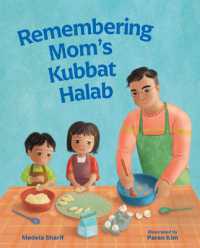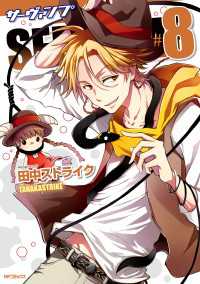基本説明
This collection wrestles with the problems of situating Canadian literature in the ongoing debates about culture, identity, and globalization, and of applying the slippery term of postcolonialism to Canadian literature.
Full Description
How can postcolonialism be applied to Canadian literature? In all that has been written about postcolonialism, surprisingly little has specifically addressed the position of Canada, Canadian literature, or Canadian culture.
Postcolonialism is a theory that has gained credence throughout the world; it is be productive to ask if and how we, as Canadians, participate in postcolonial debates. It is also vital to examine the ways in which Canada and Canadian culture fit into global discussions as our culture reflects how we interact with our neighbours, allies, and adversaries.
This collection wrestles with the problems of situating Canadian literature in the ongoing debates about culture, identity, and globalization, and of applying the slippery term of postcolonialism to Canadian literature. The topics range in focus from discussions of specific literary works to general theoretical contemplations. The twenty-three articles in this collection grapple with the recurrent issues of postcolonialism - including hybridity, collaboration, marginality, power, resistance, and historical revisionism - from the vantage point of those working within Canada as writers and critics. While some seek to confirm the legitimacy of including Canadian literature in the discussions of postcolonialism, others challenge this very notion.
Contents
Table of Contents for Is Canada Postcolonial? Unsettling Canadian Literature , edited by Laura Moss Preface: Is Canada Postcolonical? Introducing the Question | Laura Moss Part 1: Questioning Canadian Postcolonialism What Was Canada? | George Elliott Clark What Resides in the Question, âIs Canada Postcolonial?â | Neil Besner Canada and Postcolonialism: Question, Inventories, and Futures | Diana Brydon Looking Elsewhere for Answers to the Postcolonial Question: From Literary Studies to State Policy in Canada | Donna Palmateer Pennee Part 2: Postcolonical Methodologies The Absence of Seaming, Or How I Almost Despair of Dancing: How Postcolonical Are Canadaâs Literary Institutions and Critical Practices? | Susan Gingell Native Writing, Academic Theory: Postcolonialism across the Cultural Divide | Judith Leggatt Nostalgic Narratives and the Otherness Industry | Mridula Nath Chakraborty Cool Dots and a Hybrid Scarborough: Multiculturalism as Canadian Myth | Chelva Kanaganayakam Part 3: Is Canadian Literature Postcolonial? Imagining Eighteenth-Century Quebec: British Literature and Colonical Rhetoric | Pam Perkins âI too am a Canadianâ: John Richardsonâs The Canadian Brothers as Postcolonical Narrative | Douglas Ivison Are We There Yet? Reading the âPost-Colonialâ and The Imperialist in Canada | Cecily Devereus Figures of Collection and (Post)Colonical Processes in Major John Richardsonâs Wacousta and Thomas Kingâs Truth and Bright Water | Barbara S. Bruce Stolen Life? Reading through Two Iâs in Postcolonical Collaborative Autobiography | Manina Jones âA Place to Stand Onâ: (Post)colonical Identity in The Diviners and âThe Rain Childâ | Karen E. Macfarlane A âPlaceâ Through Language: Postcolonical Implications of Mennonite/s Writing in Western Canada | Amy Kroeker Whatâs Immigration Got to Do with It? Postcolonialism and Shifting Notions of Exile in Nino Ricciâs Italian-Canadians | Jim Zucchero Religion, Postcolonical Side-by-sidedness, and la transculture | Marie Vautier After Postcolonialism: Migrant Lines and the Politics of From in Fred Wah, M. Nourbese Philip, and Roy Miki | Robert Budde Part 4: Meditations on the Question Is Canada a Postcolonial Country? | Len Findlay Answering the Questions | Terry Goldie Answering the Answers, Asking More Questions | Victor J. Ramrag Afterword | Stephen Slemon Bibliography Notes on Contributors Index Notes on Contributors Neil Besner, Dean of Humanities at The University of Winnipeg, has taught Canadian literature there since 1987. His publications include books on Mavis Gallant (1988) and Alice Munro (1991), and co-edited collections of short fiction and poetry. His most recent work includes a co-edited special issue, with Sergio Bellei, of the Brazilian journal Desterros (2003) exploring Brazilian/Canadian versions and visions of postcolonial theory across the two cultures. His translation of the Brazilian biography of Elizabeth Bishop and Lota de Macedo Soares, Rare and Commonplace Flowers , appeared in 2002, and his edited collection of essays, Carol Shields: The Arts of a Writing Life is forthcoming in 2003. Barbara S. Bruce is a PhD candidate at The University of Western Ontario. Her doctoral thesis, for which she has received SSHRC doctoral support, examines representations of museums and collecting in Canadian literature. Currently working as adjunct faculty at UWO, she is teaching courses on reading culture through literary and filmic representations of cuisine and horror. Diana Brydon, Robert and Ruth Lumsden Professor of English, teaches Canadian and postcolonial literatures at The University of Western Ontario. The author of books on Timothy Findley and postcolonial literature, she has edited Postcolonialism: Critical Concepts in Literary and Cultural Studies (2000) and co-edited Shakespeare in Canada: A World Elsewhere? (2002). She is currently working on globalization, autonomy, and postcolonial studies with funding support from SSHRC. Robert Budde teaches creative writing and critical theory at The University of Northern British Columbia. He has published two books of poetry, Catch as Catch and traffick , and two novels, Misshapen and, most recently, The Dying Poem . He has a collection of short prose, flicker , and interviews In Muddy Water: Conversations with 11 Poets , forthcoming in 2003. Mridula Nath Chakraborty completed her M.Phil in English from the Faculty of Arts, University of Delhi, in 1995. She subsequently taught English literature at various colleges affiliated to The University of Delhi. She is currently pursuing her PhD in English at The University of Alberta. Her dissertation explores the tensions between postcolonial identity politics in the academy and third-world feminisms of colour in white-settler colonies. She has also translated and co-edited, with Dr Rani Ray, A Treasury of Bangla Stories (1999). She is now translating a collection of short stories by modern Hindi writers. George Elliot Clarke is a self-proclaimed âAfricadianâ (African-Nova Scotian), with maternal roots in Nova Scotia dating back to 1813. Clarke taught at Duke University, 1994â99, and is now an associate professor of English at The University of Toronto. A pioneering authority on African-Canadian literature, Clarkeâs latest critical book is Odysseys Home: Mapping African-Canadian Literature (2002). Also a noted poet, playwright, and librettist, Clarke received the 2001 Governor-Generalâs Literary Award for Poetry for his book, Execution Poems . Cecily Devereux is an associate professor in the Department of English at The University of Alberta. Recent work on gender, race, and empireâwith particular reference to white slavery and to the politics of imperial motherhood have appeared in the Victorian Review , Canadian Childrenâs Literature , Essays on Canadian Writing , and Womenâs Studies International Forum . A scholarly edition of L.M. Montgomeryâs Anne of Green Gables is forthcoming (2003). Len Findlay is Professor of English and Director of the Humanities Research Unit at The University of Saskatchewan. Widely published in nineteenth-century studies, literary theory, and the nature and role of universities and the humanities in Canada, his most recent work includes a co-edited collection, Pursuing Academic Freedom: âFree and Fearlessâ? (2001). He is currently collaborating on a SSHRC-sponsored endeavour entitled âDecolonizing Education: An Interdisciplinary Aboriginal Research Project.â Susan Gingell teaches and researches Canadian and other decolonizing Anglophone literatures at The University of Saskatchewan. Her work is informed by feminist, anti-racist, and anti-homophobic politics. Past publications include E.J. Pratt, On His Life and Poetry and Pursuits Amateur and Academic: The Selected Prose of E.J. Pratt , as well as an edition of stories from Saskatoon, The Bridge City Anthology , and essays on a wide-range of authors and subjects. Her current research project is on textualizing orature and orality in Canadian/Turtle Island and Afro- Caribbean contexts. Terry Goldie teaches at York University. He is the author of Fear and Temptation: The Image of the Indigene in Canadian, Australian and New Zealand Literatures (1989) and Pink Snow: Homotextual Possibilities in Canadian Fiction (2003); editor of In a Queer Country: Gay and Lesbian Studies in a Canadian Context (2001) and co-editor (with Daniel David Moses) of Canadian Native Literature in English (1998). He is at present working on a book tentatively titled Lifewright: A Theoretical Sexual Autobiography . Douglas Ivison teaches Canadian literature at Memorial University of Newfoundland. He is the editor of The Dictionary of Literary Biography 251: Canadian Fantasy and Science-Fiction Writers (2002), and has published a number of articles on nineteenth and twentieth century Canadian, American, and British literatures. Heâs currently completing a book on adventure literature and spatial theory, and is also pursuing research on the representation of the urban in Canadian literature. Manina Jones is an associate professor in the Department of English at The University of Western Ontario, where she teaches courses on Canadian literature, critical theory and detective fiction. She is coauthor, with Priscilla L. Walton, of Detective Agency: Women Re-Writing the Hard-Boiled Tradition (1999), and author of That Art of Difference: Documentary-Collage and English Canadian Writing (1993), as well as articles on Canadian poetry, fiction, and drama. Chelva Kanaganayakam is currently Professor of English at The University of Toronto. His publications include, Structures of Negation: The Writings of Zulfikar Ghose (1993), Configurations of Exile: South Asian Writers and Their World (1995), Dark Antonyms and Paradise:


![[合本版]神曲奏界ポリフォニカ エイフォニック・ソングバード 全4巻 GA文庫](../images/goods/ar2/web/eimgdata/EK-0441432.jpg)





